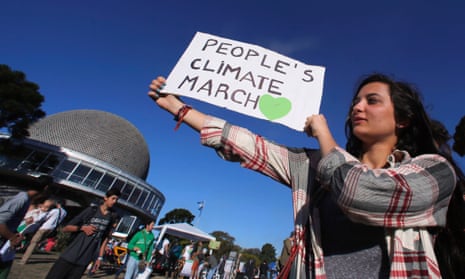Julie Bishop has told a UN summit that Australia has an “ambitious” carbon emissions reduction target but did not address the crucial question of what the country’s goal of dealing with climate change beyond 2020 will be.
The foreign affairs minister told the Major Economies Forum in New York that Australia was “serious about taking practical steps in response to climate change”.
“In terms of ways to drive near-term action on climate change, Australia remains committed to reducing emissions by 5% below 2000 levels by 2020,” she said.
“This is an ambitious target. Australia will reduce emissions by 22% against business-as-usual levels. This compares well to other major economies. It has bipartisan support in Australia.”
Bishop said Australia was committed to a “global and enduring climate agreement in 2015”, which is when nations gather in Paris to set what many hope will be strong emissions reduction commitments beyond 2020.
She said it was important that the major emitters, such as the US and China, put forward their pledges well in advance of the Paris meeting.
Australia would “consider its post-2020 target as part of the review we will be conducting in 2015 on Australia’s international targets and settings”.
“This review will focus on the extent to which other nations, including the major economies and Australia’s trading partners, are taking real and comparable action to reduce emissions,” she said.
Bishop was speaking ahead of a one-day UN meeting, attended by 125 world leaders, that is intended to galvanise governments to create strong post-2020 commitments.
Ban Ki-moon, the UN secretary general, has called for “bold announcements and actions” from nations, while a series of rallies held across the world ahead of the meeting urged governments to take urgent action to head off dangerous climate change.
While Australia plans to cut emissions by 5% by 2020, the US has a target of 17% by this period, on 2005 levels. The European Union’s 28 member states have a commitment to a 20% emissions cut by 2020, with the European Commission president committing this week to a 40% reduction by 2030.
Australia’s Climate Change Authority, which the Coalition government wishes to abolish, has called the country’s 5% goal “inadequate”, calling for a reduction of at least 15%.
The Coalition’s plan to reduce emissions is its Direct Action policy, which it has yet to legislate. The $2.55bn plan involves the paying of grants to businesses that wish to reduce their emissions.
The government has not conducted any modelling on the effectiveness of the policy, with independent analysis finding that it will struggle to meet the 5% reduction target.
Figures released this week showed that the world emitted a record 36 billion tonnes of greenhouses gases in 2013, with that total set to rise by a further 2.5% this year. This puts the planet on course for warming of between 3.2C and 5.4C by 2100 – a temperature level that is considered largely incompatible with modern human civilisation.
John Connor, chief executive of the Climate Institute, said from New York that it would be a “great disappointment” if Bishop did not at least lay out a timeline for Australia’s post-2020 emissions targets at the UN summit.
“We also really want Australia to reiterate its commitment to avoiding 2C of global warming,” he said. “We can’t pretend a 5% is adequate. You may get away with that in polite diplomatic circles, but no nation really believes 5% is a fair dinkum effort.
“I think there’s a broad disappointment with what Australia’s doing, following the repeal of the carbon price. We are now moving to the margins because we are showing very little ambition. That’s a risky thing to do given that we are a high-carbon economy.”

Comments (…)
Sign in or create your Guardian account to join the discussion